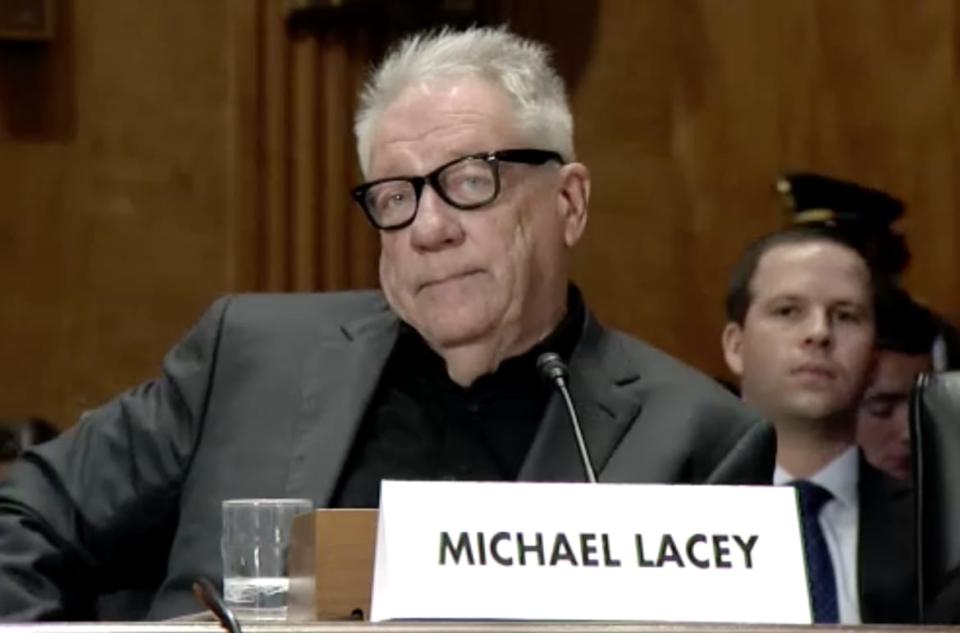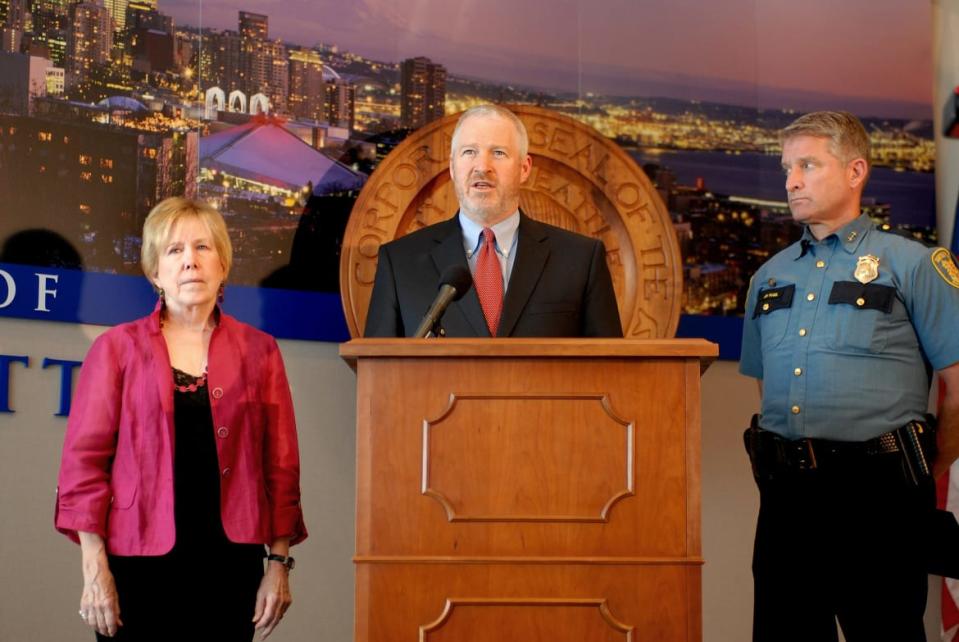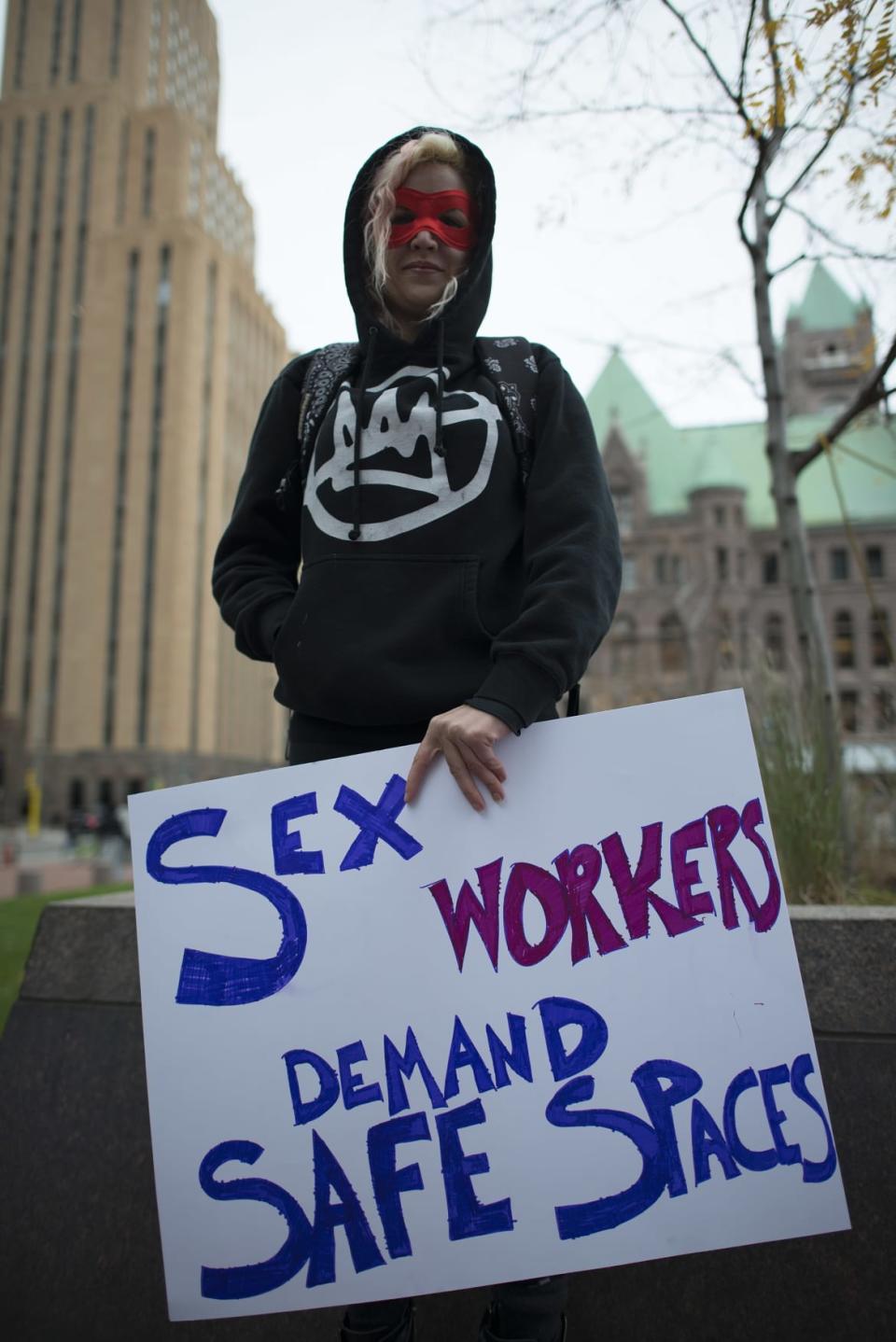Backpage Kingpins Go on Trial—and Sex Workers May Pay the Price

- Oops!Something went wrong.Please try again later.
- Oops!Something went wrong.Please try again later.
Three years after the most popular place to advertise “adult services” was seized by the U.S. government, its founders will stand trial Wednesday in an Arizona courtroom, in a case that could have lasting repercussions for the future of online sex work.
The defendants, alt-weekly titans Michael Lacey and James Larkin, claim their website, Backpage.com, was a utopia for free expression, a place where “unpopular” speech was allowed to flourish and thrive. But the U.S. Department of Justice contends it was also a place where women and girls were sex trafficked against their will, with Lacey and Larkin’s knowledge.
Whom the judge sides with will determine whether Lacey and Larkin are locked away for decades, and whether online sex work—and possibly online expression, in general—will ever look the same again.
“Sex workers are the canary in the coal mine,” said Savannah Sly, a longtime sex worker and advocate from Seattle. “And the general public better pay attention to what happens with Backpage.”

Michael Lacey testifies before the U.S. Senate in 2017.
Until their homes were raided and their assets seized, Larkin and Lacey were, in many regards, an internet success story. After founding the Phoenix New Times as pugnacious college journalists, the pair went on to purchase more than 17 local magazines across the United States, amassing the largest chain of alt-weeklies in the country. Just as print revenues started to fade, they had the idea to digitize the classified ads in the back of their papers and put them on a website: Backpage.com.
While Backpage took ads for anything from cars to trading cards, the bulk of its revenue came from so-called “adult” ads, which offered services the government argues were lightly coded euphemisms for prostitution. (Among the offerings were ads for an “extremely horny sexy newbie” and a “dark Asian bombshell with a nice & tight booty,” according to an indictment.) The idea proved hugely profitable: The site went from earning $26 million in 2010 to more than $134 million in 2014. By 2015, it had reportedly earned its owners more than $500 million.
But while the earnings piled up, so did the horror stories: women and girls allegedly held against their will and trafficked by pimps, friends, or family members using Backpage as a marketing tool. (One woman said she was raped more than 1,000 times after being advertised on the site as a teenage runaway.) Backpage became a white whale for ambitious young prosecutors looking to prove their chops, and for politicians hoping to muster goodwill in an election year. Three states passed laws specifically intended to take the website down; 51 state attorneys general signed onto a letter accusing the site of being a “hub” for human trafficking. Dozens of alleged victims filed civil suits. None of it stuck.
Backpage’s founders wrestled themselves out of these legal battles with the winning combination of a well-funded legal team and a 1996 federal law: Section 230 of the Communications Decency Act, which states that website owners cannot be held liable for what users post on their platforms. In 2016, when authorities in Texas and California raided the website’s Dallas headquarters and charged the founders with “pimping” and “pimping conspiracy,” a Superior Court judge dismissed the charges, explicitly citing Section 230. When then-California Attorney General Kamala Harris filed new charges against the founders that same month, a judge dismissed them again.
The only legal challenge that seemed to stick was a 2012 suit by three Washington women who claimed they were trafficked via Backpage when they were as young as 13 years old. The state Supreme Court ruled that the case could go forward, and Backpage eventually settled. At the same time, however, the founders unwittingly avoided criminal prosecution in the same state—in part thanks to their own cooperation with authorities.

Then-Seattle Mayor Mike McGinn, center, was among the Washington officials who condemned Backpage in 2012.
According to documents published by Reason, federal prosecutors in the Western District of Washington reviewed more than 100,000 documents and interviewed more than a dozen witnesses in 2012 in an attempt to bring a case against Backpage, but failed to find a smoking gun. In fact, according to a memo written by two assistant U.S. attorneys at the time, local FBI agents found the company “remarkably responsive to law enforcement requests” and said the site “often takes proactive steps to assist in investigations.”
“At the outset of this investigation, it was anticipated that we would find evidence of candid discussions among [Backpage] principals about the use of the site for juvenile prostitution which could be used as admissions of criminal conduct," the attorneys wrote in a 2013 update to the memo. "It was also anticipated that we would find numerous instances where Backpage learned that a site user was a juvenile prostitute and Backpage callously continued to post advertisements for her. To date, the investigation has revealed neither.”
After more than a decade of success, Larkin and Lacey’s luck eventually ran out. The U.S. Senate, which had been investigating Backpage for years, successfully subpoenaed millions of pages of internal documents and published them in a highly damaging report in 2017. Among the documents were internal emails that the government claims show Backpage employees intentionally removed words from advertisements that suggested prostitution—and even more damningly, child prostitution—and published them anyway, getting rid of the evidence but not the crime. In response to the report, Backpage pulled its adult ad section, blaring the word “censored” across the page.
A little over a year later, in a 61-page indictment that pulled heavily from the Senate investigation, the U.S. Department of Justice hit Lacey, Larkin, and five other Backpage employees with 93 counts, including several kinds of money laundering and conspiracy to facilitate prostitution. Federal authorities raided Lacey’s home and arrested Larkin on the Phoenix airport tarmac; they also seized the website and most of the founders’ other assets. Larkin and Lacey have been on house arrest ever since.

James Larkin, Backpage co-founder.
Supporters point out that the founders and other employees were never charged with trafficking—most of the charges stem from the 1960s-era Travel Act, which prohibits businesses from conducting illegal activity like gambling and prostitution across state lines. But the indictment also provided documents that strongly suggest employees of Backpage had seen, and in some cases, removed, evidence of underage girls being advertised on their site. In one particularly jarring example, prosecutors allege that an employee shared a list of words to be “filtered” from advertisements before publication, which included terms like “lolita,” “young,” and “high school.”
Attorneys for Larkin and Lacey argue that they were simply publishing advertisements for escort and massage services, as alt-weeklies have done since their inception. They claim this is a First Amendment case, and that requiring Backpage to reject ads simply suggestive of prostitution would be an illegal infringement on free speech—an odorous idea to the founders of a mud-slinging independent journalism empire.
In a typically swashbuckling statement released before the trial, Larkin and Lacey decried the prosecution as an “epic government overreach and an unprecedented assault on the First Amendment and freedom of speech” and claimed they were being held “vicariously responsible for the criminal acts of others.”
“The culprits here are not publishers and editors, or the executives of an interactive website,” they wrote. “Rather, they are self-serving politicians with historical vendettas and overzealous prosecutors who placed their own ambition above the safety and welfare of women.”
They added: “Taking down Backpage was more important to these people than doing the hard work of making women and marginalized communities safer.”

Sex Workers and their supporters rallied in Minnesota in 2016 to protest a law enforcement crackdown on Backpage.com.
Like the trials of so many adult website owners—Jeffrey Hurant of RentBoy and Eric Omuro of myRedBook among them—the prosecution of Larkin and Lacey could have been a fleeting headline; a mere notch in the belt of aggressive DOJ prosecutors. But in the days after their arrest, something happened in Washington that brought the plight of online sex workers to national attention: President Trump signed into law FOSTA/SESTA, a law that cut into the heart of Section 230 and made online publishers responsible for any ads on their sites promoting prostitution.
In a statement celebrating the signing of the bill, House sponsor Rep. Ann Wagner (R-MO), claimed it would bring “solace to survivors,” and give law enforcement “new tools” with which to “crack down on this scourge against humanity.” Sex workers warned that it would have the opposite effect, pushing them off the internet and onto the streets, where they had fewer protections and less control over who they saw and when. Civil liberties groups including the ACLU, Electronic Frontier Foundation, and Center for Democracy and Technology all came out against it.
In the weeks after its passage, FOSTA/SESTA felled not only Backpage, but other adult advertising sites like Massage Republic and Cityvibe, and even the Craigslist personal ads section. The impact was tangible: A survey from the sex worker advocacy group Hacking/Hustling found 33.8 percent of respondents reported an increase in violence from clients after the law was signed, and 72.5 percent reported they were facing increased financial insecurity. Advocates related stories of sex workers who were thrust into the arms of pimps in order to find work, or back into abusive relationships for want of somewhere to stay.
Even the federal government admitted that the law had unintended consequences. In a June 2021 report, the Government Accountability Office reported that the online sex trade had fragmented and moved largely overseas in the aftermath of FOSTA/SESTA, making it harder to both track offenders and find victims. The FBI’s ability to locate sex trafficking victims and perpetrators “significantly decreased following the takedown of backpage.com,” the report states. It adds: “According to FBI officials, this is largely because law enforcement was familiar with backpage.com, and backpage.com was generally responsive to legal requests for information.”
As time went on, the restrictions around online sex work grew tighter and tighter. In May 2018, Reddit removed several sex work discussion forums; in December of that year, Tumblr removed all explicit content from its site. Caught up in the firestorm, Backpage, and by default, Larkin and Lacey, became a symbol for the larger fight for sex workers’ rights online.
Whether Larkin and Lacey want this status is less clear. Their pre-trial statement paints them as free-speech warriors valiantly defending “offensive” and unpopular speech.” Conspicuously missing from the statement, as journalist Melissa Gira Grant pointed out on Twitter, are the words “prostitution” or “sex work;” there is only a glancing reference to “adult advertising.”
Kaytlin Bailey, a former sex worker and host of The Oldest Profession Podcast, says the longtime newspapermen are now telling the wrong story.
“I were in their shoes, the story I would be telling is the story of the survival of their users,” she said, referring to the sex workers who lost their source of income when the site was taken offline.
“They think of themselves as free speech warriors, and I think sex workers think of themselves as in a fight for survival.”
The former Backpage owners’ trial still drags on, more than three years now since they were charged. And while I appreciate the challenge made to the press here re: free speech, it’s rich that they don’t name the actual service BP provided and to who. https://t.co/2EzyjItErA
— Melissa Gira Grant (on book leave) (@melissagira) August 30, 2021
In the years leading up to the trial, Lacey and Larkin have lost some of their prominence. They are not being prosecuted under FOSTA/SESTA, and while their case may pose an interesting loophole to Section 230, it is not a direct challenge. The free speech champions who rallied to their defense during previous legal fights have issued no statements in advance of their criminal trial. And sex workers have other concerns to worry about: a global pandemic; the heavily criticized and hastily reversed decision to ban porn from OnlyFans.
But Alexandra Yelderman, a visiting assistant professor at the University of Notre Dame Law School, argues that the trial still holds serious significance—more so than the criminal prosecutions of RentBoy, myRedBook, and other adult websites. While those sites only advertised sex work, Yelderman said, Backpage advertised other services, such as housing, cars, and temporary jobs. And everyone should be concerned that the government would jeopardize that kind of speech to get at the other stuff.
“What the Backpage takedown and prosecution is an example of is the government's willingness to throw all sorts of speech under the bus here, in order to get at speech that—according to the indictment—facilities the crime of prostitution,” she said.
“This is not a trafficking prosecution,” she added. “This is a case where allegations that [the founders] facilitated prostitution were an impetus for the government to take aim at this entire swath of speech.”
After more than three years, the trial will start Wednesday in federal district court in Phoenix. Backpage’s defense has already taken a series of pre-trial blows; among them, the decision to let Judge Susan Brnovich stay on the case, despite being married to an Arizona prosecutor who previously mounted an aggressive campaign against the site. Among the potential witnesses are Lacey and Larkin’s former lieutenant, who took a plea deal and flipped on them in 2018, and family members of women who died after being advertised on Backpage.
At least a few supporters will also be in the courthouse—the sex worker collective Desiree Alliance has already said it will be in attendance. And even Bailey, despite her hesitations, will be watching it closely.
“We need guys like the owners of Backpage,” she said Monday. “We need folks that are willing to guard the people that are engaging in survival work, that are doing things polite society would rather they didn’t. Because polite society has demonstrated that they’re willing to see us die rather than coexist with us.”
Get our top stories in your inbox every day. Sign up now!
Daily Beast Membership: Beast Inside goes deeper on the stories that matter to you. Learn more.

